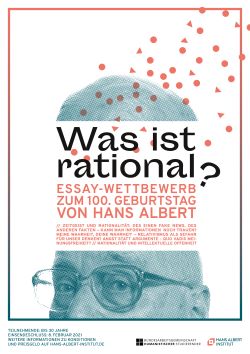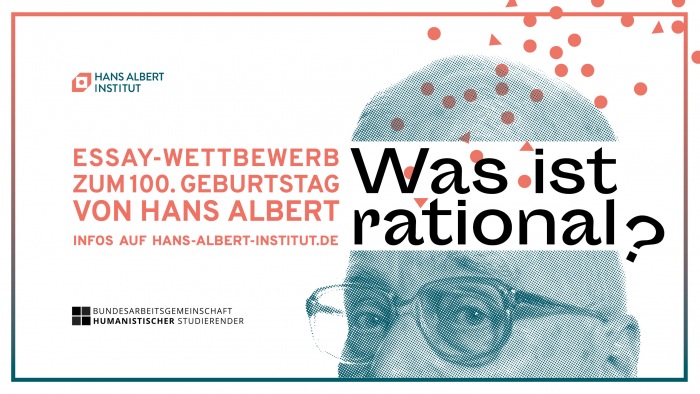"What Is Rational?"
Essay competition on the occasion of Hans Albert's 100th birthday
The most important proponent of critical rationalism in Germany, Hans Albert, will be 100 years old next year. To mark the occasion, the Hans Albert Institute (HAI) and the Bundesarbeitsgemeinschaft Humanistischer Studierender are launching an essay competition for young people up to the age of 30 on the topic "What is rational?" The closing date for entries is the 100th birthday of Hans Albert on February 8, 2021.
From an evolutionary perspective, politics was often a matter of life and death. And so, unfortunately, political discussions can easily seem like a "continuation of war by other means" even today. In view of the fundamental challenges facing humanity in the 21st century, we can no longer afford to blindly follow our evolutionary heritage. Instead, we need a culture of rational discourse in which people show their willingness to take a sober view of the facts, detached from collective thinking patterns, and gradually come closer to "the truth" in a fair exchange with one another.
Philosopher Hans Albert embodies this ideal in his work like no one else. As a pioneer of Critical Rationalism, he stands for a scientific way of thinking which is characterized by clarity, the ability to accept criticism, and openness to alternative approaches. He shows that the endeavour for critical rationality is an essential ethical obligation, which we should all strive to meet.
On the occasion of the 100th birthday of this exceptional thinker (and gbs advisory board member) in February 2021, the Hans Albert Institute (HAI), in cooperation with the Bundesarbeitsgemeinschaft Humanistischer Studierender, therefore encourages young people up to the age of 30 to internalize the virtues of critical-rational discourse and invites them to participate in the essay competition "Was ist rational?" High school students are explicitly invited to send in their essays by February 8, 2021. Specifically, entries are requested in the following two categories:
Category I – Zeitgeist and Rationality
The perspectives on socio-political developments in recent years are controversial, but still inseparably interwoven with the question of the meaning of rationality and how we deal with those who have differing views. For this reason, the first category will award prizes to creative contributions that deal in 1,000 - 3,000 words with at least one of the following three questions reflecting the current zeitgeist:
From fake news to facts - can information still be trusted? In a time in which political discussions are increasingly ruthless and the frequently invoked filter bubbles seem to algorithmically regulate our access to knowledge, the question arises whether and how one should process, let alone critically examine, the vast amounts of arguments, data, facts and figures with which we are confronted every day. How can we deal rationally with these challenges?
My truth, your truth - relativism as a danger to our thinking? In recent years, a doctrine of the equivalence of different convictions has been spreading, which can be polemically summarized as "Every person has a right to their personal truth". How should we view such a paradigm from a critical-rational perspective? And how does it affect our life in society?
Fear instead of arguments - quo vadis freedom of opinion? In recent years, the term "Cancel Culture" has been established as a characterization of a state in which the limits of what can be said seem to be increasingly narrowed by forced disinvitations or even the threat of violence. Some commentators lament an escalating level of political correctness and see our freedom of expression in danger. Are these diagnoses accurate? How important is freedom of opinion for a functioning, rational social discourse?
Category II – Rationality and intellectual openness
There are few things more difficult than admitting that you were wrong. Acknowledging that the other side was right, and radically revising your position in face of the facts, is often interpreted as a sign of weakness and failure. But nothing could be further from the truth: Only if we are willing to honestly consider new evidence, accept its logical consequences and integrate it into our own views can we as a society make progress.
Intellectual openness, curiosity about other positions and the ability to leave loved but erroneous views behind are valuable virtues that are indispensable for a lifestyle oriented towards the values of rationality and must be appreciated. We are therefore looking for contributions of between 1,000 and 3,000 words in length in which participants describe their experiences of admitting that they were wrong on an issue of importance to them. What was the original position? How has it changed? What was the trigger? How did you cope with it? How did your social surroundings react? Has the experience changed your own process of forming opinions in a lasting way? Such and similar questions can be discussed in this category.
Prizes of the essay competition
 An interdisciplinary and top-class jury decides who will be awarded the prizes. In both categories, the first-place winners receive a cash prize of 1,000 euros, the second-place winners a prize of 500 euros and the third-place winners a book prize from the publications of the Giordano Bruno Foundation, which founded the Hans Albert Institute in February 2020. Special recognition for high school students will also be granted.
An interdisciplinary and top-class jury decides who will be awarded the prizes. In both categories, the first-place winners receive a cash prize of 1,000 euros, the second-place winners a prize of 500 euros and the third-place winners a book prize from the publications of the Giordano Bruno Foundation, which founded the Hans Albert Institute in February 2020. Special recognition for high school students will also be granted.
The winners will be presented with their awards at the grand symposium marking Hans Albert's 100th birthday in Würzburg in September 2021. In addition, the best contributions will be published in an anthology.

